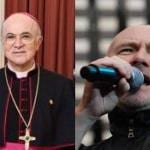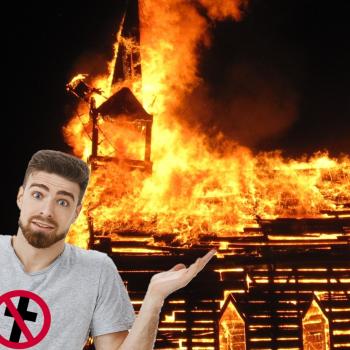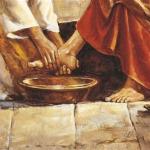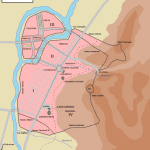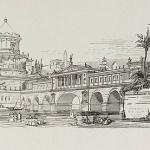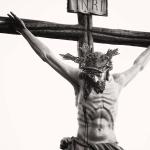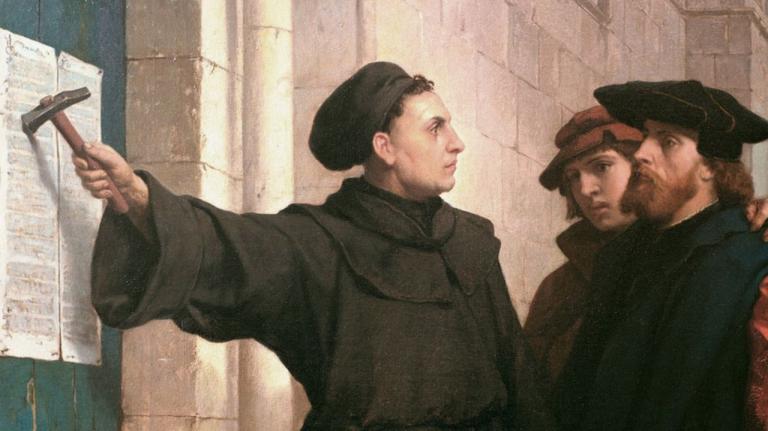
When I attended an Evangelical summer youth camp when I was 17, we had a theme called ‘couch potatoes.’ For those of us who spend copious amounts of time watching television, playing video games or scrolling through social media, it’s easy to allow ourselves to sit on the couch while not considering the content we absorb from the screen. Whether it’s watching or reading a news story, a kid’s show or even the latest season of our favorite reality-TV show, we often would rather relax and enjoy what we’re watching without feeling the need to use our exhausted brains. A major point emphasized during that week of camp was how we ought to make an effort to think critically about everything that crosses our path — even if it’s something as trivial as entertainment.
To make matters more interesting, that was the same week I had decided to take my faith in Christ seriously after hearing a guest speaker sermonize about the importance of forgiveness. Following that moment in my life, I held the message about thinking critically close to my heart as I began to take up reading my Bible and had many theological discussions with my Christian friends. This eventually led me to question the beliefs I held as a poorly catechized nominal Catholic. To make a long story short, I was led to believe that the Catholic Church was a product of man-made religion gone to the dogs. After all, what’s the point of having all these made-up rules, traditions and expectations that do nothing but make people feel like their salvation is always hanging in the balance? It made sense to me at the time that I ought to be critical of what I had been taught by the Church I was raised with.
As I continued in my journey of faith and read into Church history, I learned about a pivotal historical moment that seemed to be glorified almost equally to the Gospels themselves. The Protestant Reformation is considered by many Christians as a time when the Church had finally awakened after remaining dormant in a nearly 1500-year period of darkness and the Gospel of Christ had finally been renewed in the hearts of many. This was apparently sparked after an Augustinian monk named Martin Luther grew disillusioned with the widespread corruption within the Church. He nailed a list of 95 Theses upon the door of All Saints Church in Wittenberg, Germany with hopes to encourage positive change. 1 This list was a compiled summary of concerns Luther had regarding abuses in matters of faith and the sales of indulgences.
As a millennial myself, I once thought of Luther as one of the greatest social justice warriors next to Jesus Himself. As a recovering Catholic in my teenage years, he was someone who appealed to me as a heroic figure who stood up against an oppressive institution whose hierarchy was corrupt all the way to the Pope himself. I admired reading about his seemingly unwavering faith and bravery to confront the clerical authorities of Rome with a seemingly righteous fury. 2
These days, it seems like being passionate about social justice and partaking in political movements is apparently a sign of virtuous behavior. But regardless of what type of worldview a person aligns with, I’ve often noticed that those who were the most harshly outspoken critics of the things they opposed were usually the least informed of what they were actually protesting against. People in general seem to be easily influenced by what they choose to feed their brains – whether it be from the media, from the books they read or from the people they surround themselves with. As painful as it is for me to admit, I’m guilty as charged as well. In many ways, how people view history really depends on who or what they get their information from. All too often, people have a tendency to only seek for wisdom from sources they would automatically agree with to affirm their confirmation biases — which is where the ability to think critically comes in.
In order to discern the truth about an event as complex as the Protestant Reformation, one needs to be able to look at it objectively.
In one perspective, it’s easy to picture Luther playing the role of a 16th century social justice warrior with his eyes set on saving the Church from a terrible fate. Admittedly, the problem with this type of approach is it panders to the propagandist bias of the anti-Catholic mind. The Reformation is often viewed as a dawning of a new era when people would finally have access to the Scriptures by owning their own copy, thanks to the invention of the printing press. 3 Men who were formerly members of the Catholic Church rose up to oppose the papal regime and became known as the Early Protestant Reformers. 4 Because of these men, people suddenly believed they no longer needed priests, clergy or even the Pope to help lead them to Christ and could approach God through faith in Jesus on their own anytime.
But this supposed liberty did not come without a heavy cost.
In a Catholic perspective, it was not a reformation at all, but a massive political revolt against the Church. While Luther may have initially had good intentions to reform the Church from within, the results of his actions proved to be more recklessly catastrophic. In the wake of this movement didn’t come reform, but widespread polarization and civil unrest where people from both Catholic and Protestant sides were persecuted, tortured and killed for merely not subscribing to the polarizing groupthink. 5 Some Catholics would go as far as to say it was the beginning of the Great Apostasy as prophesied in the Bible 6, although the Church does not have an official position on such a claim.
This does not absolve the Catholic Church of the horrific executions that came out of it. Nearly 300 Protestants were burned at the stake for heresy during Queen Mary I’s reign as she attempted to restore a Catholic monarchy – hence why she is infamously referred to as Bloody Mary. This account of Church history significantly contributed to widespread nationalistic animosity towards Rome. 7
I sincerely believe the Church was in desperate need for reform and continues to need it to this very day. But I also think it’s easy to forget that the Church is made up of human beings who are prone to sin. It was most certainly a dark time to be alive for both Catholics and dissenting Catholics alike. Iconoclastic vandalism and theft on church property was rampant in opposition to papal authority. 8 It’s also unimaginable living under King Henry VIII’s rule as people risked their lives sheltering Catholic clergy and hiding them within their homes. To be discovered by the English authorities with a priest in their home was to invite immediate imprisonment and often execution by being hanged, drawn and quartered. 9 There is no denying the persecution has gone both ways.
Some historians have even argued that the Reformation is one of the major factors that have contributed to the radical secularization of western society. It isn’t far-fetched to draw a line between a revolt which originally rejected traditional authority and what we see as modernist, progressive Christianity — which, inevitably, rejects the infallibility of Scripture and traditional Christian values even held by early Protestant standards. 10
I find the movement that spawned Protestantism ceases to hold water as ‘divinely inspired’ when we learn about the inconsistent theology among the Early Reformers that have multiplied over the next 500 years into what appears to be a hydra of denominations. It wasn’t until the 20th century that the Five Solas were systematically articulated together by most Protestants as the founding pillars of their theology. 11 From my perspective, it seems as though Reformed theology was less about discerning truth and more about uniting dissenting Catholics through religious gaslighting for the sake of casting out the old, ‘papist’ Roman church. There is much to be said about the use of the phrase, ‘The enemy of my enemy is my friend!’
Above: Promotional video for the Together For the Gospel conference (T4G 2016) uses propagandist imagery while proclaiming that their movement was born out of ‘protest’ compelled by the love of Christ.
(Credit: https://www.youtube.com/watch?v=iiKmUDTIjNk0)
Even in the wake of such an anarchistic religious movement, Protestants were not only persecuted by Catholics, but by other Protestants as well. The Anabaptists were heavily threatened by Christians under reformer Ulrich Zwingli’s leadership. 12 John Calvin allegedly supported burning theologian Michael Servetus at the stake for spreading blasphemy. 13 Martin Luther especially developed highly anti-semitic views which is believed to have played a significant role in influencing the rise of Nazism in post-Reformation Germany. 14
While I do not fault anyone for having been raised or agreeing with Reformed theology, what I find repulsive is the condescending glorification of a movement responsible for widespread division and theological confusion along with the deaths of thousands of Christians. Whether someone sides with Catholic or Protestant theology, the Reformation is not something that ought to be celebrated, but much rather commemorated. People generally do not celebrate Remembrance Day (Canada) or the 9/11 terrorist attacks since these are days meant to memorialize those whose lives had been lost. But to celebrate them would mean to make a mockery of what had happened in the First and Second World Wars or at the World Trade Center — the same should apply to the Protestant Reformation.
I may not be an expert historian, but my learnings have led me to believe that neither Catholics nor Protestants have the higher moral ground in the outcome of such a travesty. I believe all Christians can benefit from refraining from boasting in a movement that was motivated by the thoughts and actions of mere men. If there is one lesson I have taken away from learning about the Protestant Reformation, it is to think critically of every movement that believes itself to be on God’s side.
“May I never boast of anything except the cross of our Lord Jesus Christ, by which the world has been crucified to me, and I to the world.” — Galatians 6:14 NRSV
REFERENCES:
1 – Martin Luther (Wikipedia): https://en.wikipedia.org/wiki/Martin_Luther, 95 Theses (Wikipedia): https://en.wikipedia.org/wiki/Ninety-five_Theses
2 – The Diet of Worms (Wikipedia): https://en.wikipedia.org/wiki/Martin_Luther#Diet_of_Worms
3 – Luther’s Bible (Wikipedia): https://en.wikipedia.org/wiki/Luther_Bible
4 – Protestant Reformers (Wikipedia): https://en.wikipedia.org/wiki/Protestant_Reformers
5 – List of Protestant Martyrs of the English Reformation: https://en.wikipedia.org/wiki/List_of_Protestant_martyrs_of_the_English_Reformation#cite_note-exclassics392-203, List of Catholic Martyrs of the English Reformation: https://en.wikipedia.org/wiki/List_of_Catholic_martyrs_of_the_English_Reformation
6 – 2 Thessalonians 2:1-12
7 – Foxes Book of Martyrs (Wikipedia): https://en.wikipedia.org/wiki/Foxe%27s_Book_of_Martyrs#Objectivity_and_advocacy
8 – Iconoclasm during the Reformation: https://en.wikipedia.org/wiki/Iconoclasm#Reformation_era
9 – Priest Holes: https://www.historic-uk.com/HistoryUK/HistoryofEngland/Priests-Holes/
10 – Catholic Answers: https://www.catholic.com/encyclopedia/reformation-the, The Unintended Reformation: How a Religious Revolution Secularized Society by Brad S. Gregory: https://www.goodreads.com/book/show/11500294-the-unintended-reformation
11 – Five Solae (Wikipedia): https://en.wikipedia.org/wiki/Five_solae, Whence the Reformation Solas?: http://rscottclark.org/2008/08/whence-the-reformation-solas/
12 – Anabaptist Persecutions: https://en.wikipedia.org/wiki/Anabaptism#Persecutions_and_migrations
13 – Michael Servetus Imprisonment and Execution (Wikipedia): https://en.wikipedia.org/wiki/Michael_Servetus#Imprisonment_and_execution
14 – Martin Luther’s Anti-Semitism (Wikipedia):
https://en.wikipedia.org/wiki/Martin_Luther#Antisemitism, Elite Influence? Religion and the Electoral Success of the Nazis: https://www.kellogg.northwestern.edu/faculty/spenkuch/research/religion_nazis.pdf


